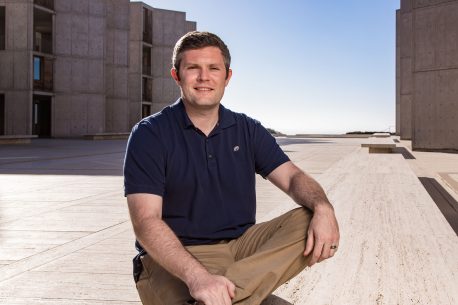
October 12, 2016
LA JOLLA—Helmsley-Salk Fellow Jesse Dixon is among 16 scientists nationwide to receive the Director’s Early Independence Award from the National Institutes of Health (NIH) to pursue promising and innovative research. Dixon is the third Salk Fellow to receive the prestigious award since it was established in 2010.

Click here for a high-resolution image
Credit: Salk Institute
Dixon, who will receive $1.25 million in funding over 5 years, received his MD/PhD from the University of California, San Diego studying how DNA is packaged into chromosomes. The double helix of human DNA, if stretched out, is two meters long, yet has to fit into cells that are over one million times smaller. To achieve this, DNA and associated proteins are folded into complex packaging within the cell nucleus. Dixon will delve into how the genome folds into three-dimensional configurations known as higher-order structure, and the implications of those structures for human disease and health.
“Jesse’s experiments will greatly expand our understanding of the mechanisms used to construct higher-order structures in our genome,” says Salk President Elizabeth Blackburn. “They will provide the necessary foundation to link our knowledge of 3D genome organization to human physical variation and disease. And, of course, we are delighted that he is the third Salk Fellow whose work is being recognized with this award.” Helmsley-Salk Fellows Dmitry Lyumkis and Patrick Hsu were 2015 recipients of the Early Independence Award for their cutting-edge research in imaging and gene editing, respectively.
With the award, Dixon will explore how the higher-order genome structure mediates communication between genes and regulatory sequences in the genome. Problems with this structure have been associated with cancer and other diseases so unraveling the connection between DNA folds and gene regulation could help to better understand human health.
“How do you take that much material and package it into such a small space? And how do you do that in such a way that you can still read the information that your genome encodes to allow a cell to use it as its blueprint for function? These are some of the questions I aim to address with the support of this award,” says Dixon.
The Early Independence Award provides an opportunity for exceptional junior scientists who have recently received their doctoral degree or completed their medical residency to skip traditional post-doctoral training and move immediately into independent research positions.
“The program continues to support high-caliber investigators whose ideas stretch the boundaries of our scientific knowledge,” said NIH Director Francis S. Collins, MD, PhD. “We welcome the newest cohort of outstanding scientists to the program and look forward to their valuable contributions.”
This year, the NIH issued 12 Pioneer awards, 48 New Innovator awards, 12 Transformative Research awards, and 16 Early Independence awards. The awards total approximately $127 million and represent contributions from the NIH Common Fund and multiple NIH centers and offices.
Office of Communications
Tel: (858) 453-4100
press@salk.edu
Unlocking the secrets of life itself is the driving force behind the Salk Institute. Our team of world-class, award-winning scientists pushes the boundaries of knowledge in areas such as neuroscience, cancer research, aging, immunobiology, plant biology, computational biology and more. Founded by Jonas Salk, developer of the first safe and effective polio vaccine, the Institute is an independent, nonprofit research organization and architectural landmark: small by choice, intimate by nature, and fearless in the face of any challenge.